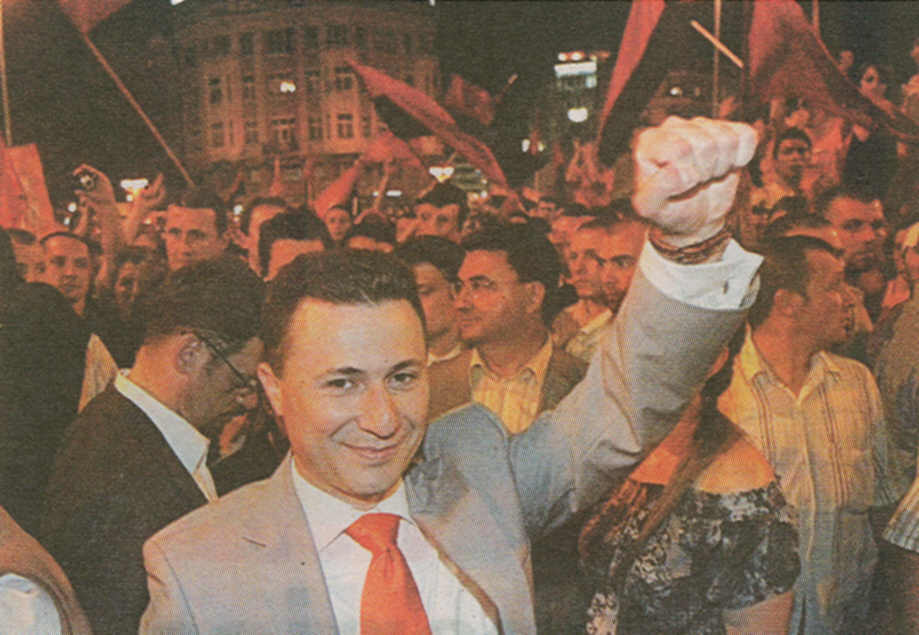 |
||
|
Greece Awaits Fyrom on Name. |
||
|
Hopes of solving the festering dispute must wait until repeat elections, but there are indications that Skopje will adopt a hardline stance By George Gilson Indeed, American and Nato officials have expressed hopes that a possible solution by July 9 would allow Skopje to be admitted to the Atlantic Alliance along with Croatia and Albania. But the first signals coming out of Skopje after the elections have suggested that Fyrom is intent upon keeping up the hardline stance towards Greece exhibited during the intense political campaign. |
 Fyrom's Prime Minister and leader of the ruling VMRO DPMNE Nikola Gruevski greets his supporters in Skopje on June 2. Gruevski's party won a landslide in a parliamentary election on June 1, a vote marred by suspected fraud and shootings that killed one person and wounded nine others in ethnic Albanian areas |
|
|
"Fyrom invoked pretexts. and unfounded justifications," Koumoutsakos said, suggesting that Greece will file a demarche with the Fyrom foreign ministry. ' Two days later, Skopje complained that Athens had barred Fyrom President Branko Crvenkovski's state aircraft from landing in Athens for a June 13 summit, and said Crvenkovski will not attend. The Greek foreign ministry replied on June 5 that a policy barring aircraft bearing the name "Republic of Macedonia" from landing in Greece has been in place for years, and that alternate modes were available. The Greek foreign ministry's initial reaction to the Fyrom elections, on June 2, noted that Athens "avoided getting caught up in the logic of statements, often of an extreme nationalistic nature, which were made during the election period in our neighbouring country". Similar statements were made by Foreign Minister Dora Bakoyannis before the Fyrom elections. Still, Koumoutsakos expressed guarded optimism about continuing the UN-sponsored negotiations, which he said Greece will pursue with the representative of the new government. Envoy Matthew Nimetz is expected to visit the region after Fyrom -conducts its repeat polls on June 15. The Ohrid agreements that helped end the fighting were intended to bolster minority rights, but the Albanian minority complains that they remain largely unenforced. Nato Secretary-General Jaap de Hoop Scheffer expressed the alliance's deep concern about the violence witnessed in the Fyrom elections, and Council of Europe President Karl Bildt called for an investigation of the scare tactics used against Fyrom voters in Albanian districts. The US State Department on June 2 called strongly for the scheduling of repeat elections and expressed optimism about a quick resolution of the name issue. "I would expect that once the name issue is resolved in the context of Nato that their membership should be able to move forward," said State Department spokesman Sean McCormack, suggesting that US pressure led to the repeat polls. Outgoing Fyrom Foreign Minister Antonio Milososki appeared less optimistic, asserting that Greece must accept the existence of a Macedonian "identity" and language if a deal is to be struck. But it is unclear why an agreement on what Fyrom is to be called and on the uses of the name Macedonia needs to settle ethnological and linguistic issues. |
||
|
|
||
(Posting Date 11 June 2008 ) HCS readers can view other excellent articles by this writer in the News & Issues and other sections of our extensive, permanent archives at the URL http://www.helleniccomserve.com./contents.html
All articles of Athens News appearing on HCS have been reprinted with permission. |
||
|
||
|
2000 © Hellenic Communication Service, L.L.C. All Rights Reserved. http://www.HellenicComServe.com |
||

